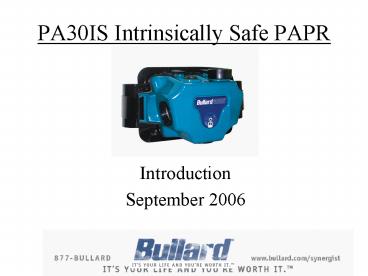PA30IS Intrinsically Safe PAPR - PowerPoint PPT Presentation
1 / 17
Title:
PA30IS Intrinsically Safe PAPR
Description:
When you work in a room full of potentially explosive vapor 'close' is not ... Merck Kodak. Pfizer Caterpillar. Astra Zeneca Mack Truck. Lilly Fluor Hanford ... – PowerPoint PPT presentation
Number of Views:56
Avg rating:3.0/5.0
Title: PA30IS Intrinsically Safe PAPR
1
PA30IS Intrinsically Safe PAPR
- Introduction
- September 2006
2
Pure Confidence
3
When you work in a room full of potentially
explosive vapor close is not good enough.
4
Introducing the new Intrinsically safe Bullard
PA30IS respirator rated for Class I Div I Group C
environments.
5
Why Bullard?
6
A History of Innovation
- Providing Safety/Hygiene Solutions for over 100
years - Providing Respiratory Solutions for over 70 Years
- Products designed specifically for Pharmaceutical
Applications for over 20 Years - 1983 First Tychem Hood Disposable Respirator
(CC20) - 1989 First Full Suit Potent Compound Respirator
(PC90) - 1996 Protection Factor Research Pioneer (ORC
Study) - 2003 PAPR with OSHA letter of 1000 APF (PA30)
- 2004 Largest Lens Tychem Hood Respirator (RT
Series) - 2006 First Intrinsically Safe PAPR with Group C
Approval (PA30IS)
7
Strong Industry Acceptance
- Our Customers Include
- Pharmaceutical Industrial
- Merck Kodak
- Pfizer Caterpillar
- Astra Zeneca Mack Truck
- Lilly Fluor Hanford
- Roche Washington Group - SRS
- Bristol Myers Squibb BXY12 Oak Ridge
- Glaxo Smith Kline
8
Intrinsic Safety A Brief Overview
9
Intrinsic Safety A Brief Overview
- If an electrical device is intrinsically safe, it
is designed to be certified by an independent
approving body, so that if it fails during normal
use and operation it will not generate enough
energy to ignite a flammable mixture of the
hazard classes specified. - Independent approving bodies include Factory
Mutual (FM), Underwriters Laboratory (UL),
Canadian Underwriters Laboratory (cUL), and MSHA
(Mine Safety and Health Administration) - References
- NFPA 325 Guide to Fire Hazard Properties of
Flammable Liquids, Gases and Volatile Solids - NFPA 497M
- NFPA 70 National Electric Code (NEC)
10
Intrinsic Safety Hazardous Locations
- Hazardous locations are places where the
possibility of fire or explosion exists because
of flammable gases, vapors, or fine dusts in the
air. The National Electric Code (NEC) segregates
hazardous environments into classes, divisions,
and groups. - Class I Divisions I II (most hazardous) Groups
A, B, C, D - Class II Divisions I II Groups E, F, G
- Class II Divisions I II (least hazardous)
11
Intrinsic Safety Class I Groups
- Hazardous Locations are further defined after
Class Division by groups of chemicals from the
most volatile and explosive to the least.
Warning IDLH no PAPRs acceptable
Warning IDLH no PAPR
See next slide
12
Intrinsic Safety Class I Div I Group C
Acetaldehyde Epichlorohydrin Allyl Alcohol
Ethylene N-Butyraldehyde Ethylenimine Carbo
n Monoxide Hydrogen sulfide Croton Aldehyde
Morpholine Cyclopropane 2-Nitropropane Dieth
yl Ether Tetrahydrofuran Diethylamine UDHM
(1,10dimthylhyrdrazine) Commonly used in
pharmaceutical chemical processing. Only the
Bullard PA30IS is rated for Class I, Div I, Group
C
13
Intrinsic Safety Applications
14
Applications
- Areas where the possibility of fire or explosion
exists because of flammable gases, vapors, or
fine dusts in the air such as - Pharmaceutical Manufacturing
- Specialty Chemical Manufacturing
- Fertilizer Manufacturing
- Grain Processing
- Painting
- Powder Coating
15
Training Resources
16
Training Resources
- Product Instruction Manuals
- Power Point Presentations
- Quick Reference Guides
- Donning/Doffing Video
- Regional on-site train-the-trainer events
17
For more information Call 1-877-Bullard or
visit www.bullard.com































